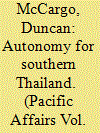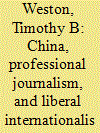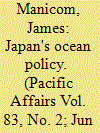|
|
|
Sort Order |
|
|
|
Items / Page
|
|
|
|
|
|
|
| Srl | Item |
| 1 |
ID:
098456


|
|
|
|
|
| Publication |
2010.
|
| Summary/Abstract |
Over 4000 people have died since 2004 in a violent conflict affecting Thailand's Malay-majority southern border provinces, Pattani, Yala, Narathiwat, and four districts of neighbouring Songkhla. Offering some form of autonomy or substantive decentralization to this troubled region might seem like an obvious response to the violence, but the topic has remained largely taboo until recently. Autonomy is seen by Bangkok in essentially pre-Cold War terms, as the thin end of the wedge, which could prefigure an unravelling of the unitary state crafted during the time of King Chulalongkorn. Nevertheless, in recent years a number of senior figures from different positions in Thai society have voiced support for alternative governance arrangements for the deep South. These have included Dr Prawase Wasi, one of the architects of the 1997 constitution, former prime minister Chavalit Yongchaiyudh, former interior minister Chalerm Yubamrung, and a number of academics. Their proposals range from full autonomy for the deep South to a national project of regionalization, as well as the creation of a new ministry to oversee the area. Prime Minister Abhisit Vejjajiva has offered mixed messages on the subject but has indicated sympathy for some form of decentralization. This article argues that despite the controversial nature of such proposals, there is a slowly emerging consensus around the need for a political solution to the conflict. In other words, Thailand is moving towards a post-Cold War understanding of autonomy as a means of preserving rather than undermining the nation state.
|
|
|
|
|
|
|
|
|
|
|
|
|
|
|
|
| 2 |
ID:
098459


|
|
|
|
|
| Publication |
2010.
|
| Summary/Abstract |
This article shows that Chinese sensitivity about the way the Western press covers China, a point of obvious relevance today, has a lengthy and rich history. The article focuses on the movement to professionalize Chinese journalism in the late 1910s and early 1920s and on ways in which that movement was bound up in a transnational conversation about journalism reform, as well as in educational institution-building efforts, that flowed from the United States to East Asia. Concentrating on linkages between China, the United States and Japan, the article argues that the effort to transfer American journalistic norms to China was undercut both by the Western-dominated political and economic forces that shaped the flow of information in the world at the time, and by the failure of Western journalism to live up to its own standards insofar as its coverage of China was concerned. Given the rising nationalism in China at that time, such problems proved very consequential. These conclusions are based on an analysis in the last section of the article of Chinese participation in the Press Congress of the World meeting convened in Honolulu, Hawai'i, in 1921. The Chinese who attended that meeting were among the most Westernized and self-consciously professional journalists in China and, as such, were in a unique position to critique Western journalism practice in China on its own terms.
|
|
|
|
|
|
|
|
|
|
|
|
|
|
|
|
| 3 |
ID:
098460


|
|
|
|
|
| Publication |
2010.
|
| Summary/Abstract |
Over a decade after it ran afoul of the Communist Party leadership, touching off a campaign of repression that led to its virtual eradication in China, the Falun Gong spiritual movement has spread across several continents and morphed into a transnational political advocacy group seeking justice and redress for the alleged persecution of its Chinese followers. Exploring a diverse selection of notable books on the subject, this review article enumerates prominent perspectives on Falun Gong's political significance and suggests its continuing relevance for understanding the durability of authoritarianism in China.
|
|
|
|
|
|
|
|
|
|
|
|
|
|
|
|
| 4 |
ID:
098458


|
|
|
|
|
| Publication |
2010.
|
| Summary/Abstract |
In 2005-2006 Japan began asserting the jurisdictional rights to its maritime domain with greater authority than ever before. Tokyo prepared to conduct exploratory drilling in the disputed East China Sea and passed new laws to permit the full realization of Japan's maritime rights and responsibilities. This activist turn appears to be at odds with most explanations of Japanese strategic policy. Given its preference for strategic evolution, Japan's sudden preoccupation with the security and administration of its extended maritime zones-the Exclusive Economic Zone (EEZ) and its extended continental shelf-following years of neglect is striking. Moreover, this shift has not received a great deal of attention in the literature. This paper argues that Japan's hesitant, ad hoc and incomplete response to its changing maritime environment can be understood through Kent Calder's "reactive state" paradigm. While academic discussion of Japanese foreign policy has moved beyond the reactive state debate, Japan's approach to its ocean policy appears to fulfill both of Kent Calder's reactive state criteria. This paper analyses Japan's resistance to the expansion of state sovereignty seaward and explores how this policy inertia was exposed by China's more active maritime policy. This more assertive Chinese posture triggered the proactive turn in Japan's ocean policy, which may have negative consequences for regional security.
|
|
|
|
|
|
|
|
|
|
|
|
|
|
|
|
| 5 |
ID:
098455


|
|
|
|
|
| Publication |
2010.
|
| Summary/Abstract |
South Korea has long been regarded as a typical example of Confucian capitalism; the Confucian tradition of elderly support has not only been well preserved but is also highly conducive to economic growth by creating strong collective bonds between Koreans. Nonetheless, the existence of an unusually large elderly workforce and a disproportionately small young workforce, together with poor working conditions for both old and young workers, demonstrates that the assumptions of Confucian capitalism do not hold true in Korea. Explanations have conventionally attributed this problem to external factors that are unrelated to Korea's industrialization, such as increased life span, the changing quality of education and a shifting value system. This study, however, adopts a new approach that emphasizes the responsibilities of Korea's unique industrialization. It proposes that the main characteristics of Korea's development pattern have distorted the supply and demand structure of the country's labour markets and have caused the current demographic imbalance between the overworked elderly and the underworked youth. Specifically, this study suggests that two characteristics of Korea's industrialization-crony capitalism and growth absolutism-affect the behaviour of young and old workers, thereby preventing them from realizing the Confucian virtue of support for the elderly through labour markets. This study implies that the affinity between development and tradition is not automatically a given in East Asia but rather is dependent on how development is designed and implemented.
|
|
|
|
|
|
|
|
|
|
|
|
|
|
|
|
| 6 |
ID:
098457


|
|
|
|
|
| Publication |
2010.
|
| Summary/Abstract |
In 2008 the Australian government announced a new labour mobility scheme for Pacific workers, with the objectives of meeting seasonal demand for low-skilled labour in the horticulture industry and promoting economic development in Pacific Island countries. Modelled on New Zealand's Recognized Seasonal Employer scheme, it is a significant departure from Australia's long-standing preference for permanent migration that is non-discriminatory with respect to the country of origin. Any temporary migration program that draws a workforce from developing countries has the potential to exploit vulnerable foreign workers, but if Australia's pilot program is to be a success in the long term, it is imperative that seasonal workers from the Pacific are not exposed to that danger. This article examines the many layers of regulation that have been introduced to protect Pacific workers from exploitation, including bilateral intergovernmental agreements, supervision by government departments and use of external advisory bodies. In addition, Australia's regulatory framework governing workplace relations imposes a range of worker protections through equality laws, occupational health and safety principles, dispute settlement procedures and trade union involvement. To date, the Australian scheme has provided very limited opportunities for Pacific workers. This raises concerns about the long-term viability of this highly regulated scheme and the capacity to move beyond a pilot program to provide sustained opportunities for both Pacific workers and the horticulture industry.
|
|
|
|
|
|
|
|
|
|
|
|
|
|
|
|
|
|
|
|
|